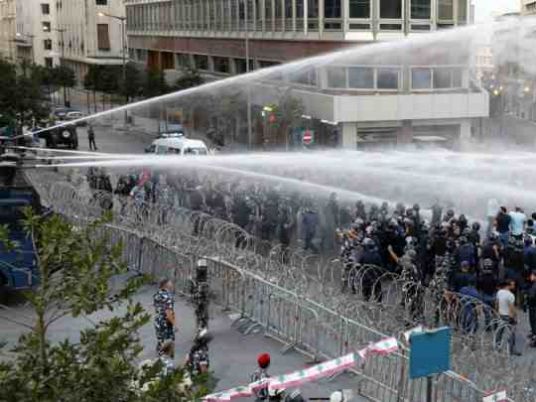
Lebanese police ejected protesters who occupied part of the environment ministry Tuesday to press the minister to resign, raising tensions over their campaign against uncollected garbage and a stagnant political class.
Imad Bazzi, one of the organisers of the "You Stink" campaign, said police had shoved a dozen activists from the building shortly after the rest had been driven out in a raid that left several people injured.
The operation began some six hours after dozens of people entered the ministry in central Beirut and began a sit-in to demand Environment Minister Mohamed Mashnuq resign.
"You Stink" activists said police had beaten some of their number, and the Red Cross said medics treated several for wounds sustained in scuffles with security forces.
The sit-in was an unexpected escalation of a campaign that began over the rubbish crisis but has evolved into a broad-based movement against government impotence and corruption.
As night fell, several hundred protesters demonstrated outside the ministry in support of the last activists who had remained inside, occasionally skirmishing with security forces.
"We will continue! Revolution!" they chanted.
A security source confirmed the evacuation of protesters was underway, with police removing a group gradually from the building's seventh floor.
An interior ministry source said some 14 demonstrators remained inside and were insisting police would have to remove them by force.
"You Stink" said on Facebook that activist "Lucien Bourjeily and a group of people participating in the sit-in were beaten and cannot be reached."
– Deep-seated frustrations –
A Red Cross official said 14 people were treated at the scene for light wounds sustained in confrontations with police.
A 15th person was treated for respiratory problems, and one activist was taken to hospital for treatment, the official added.
The "You Stink" campaign began in response to a crisis that erupted with the closure of Lebanon's largest landfill in mid-July.
But it has evolved into an outlet for deep-seated frustrations over crumbling infrastructure and a stagnant, confessional political system.
Last week, the campaign set out four key demands and set a deadline, which coincided with the start of the police evacuation.
Mashnuq was to resign, new elections were to be held, garbage collection should become a municipal responsiblity and those responsible for violence against protesters should be held accountable.
On Saturday, the campaign scored its biggest turnout yet, with tens of thousands converging on a downtown square in Beirut for a virtually unprecedented protest.
At the end of the demonstration, activists gave the government 72 hours to meet their demands, but they began their sit-in several hours before the deadline expired.
"(We began early) for the element of surprise," Bourjeily told AFP, adding additional measures could be announced later Tuesday.
"It will depend on the response of the government."
– 'Trash piling up' –
Fellow organiser Marwan Maalouf laid the blame directly on Mashnuq, who has been criticised for failing to draw up a solution to the trash crisis.
"The trash is piling up in homes everywhere, and who is responsible for this situation? It's the minister of environment," Maalouf said.
The closure of the landfill was announced last year, but despite the lead time, the government found no alternative.
As an interim solution, municipalities have been dumping trash in empty lots, river beds and valleys.
Mashnuq has said he will not resign, but he withdrew on Monday from the cabinet committee dealing with the crisis.
Media reported that Mashnuq left the embassy in a motorcade after the protesters had been evicted.
A source close to Prime Minister Tammam Salam called on demonstrators "to wait for two or three days" to hear the proposals of an ad hoc committee set up Monday and headed by Culture Minister Akram Chehayeb.
Throughout the sit-in, a crowd of supporters demonstrated outside the ministry.
"We don't want the parliament of trash, or the parliament of extension," they sang, referring to the Lebanese legislature which has extended its own term twice since 2009.
Parliament has been unable to elect a president since the Michel Sleiman's term expired in May 2014, and deep political rifts have left the cabinet too divided to function.
Parliament speaker Nabih Berri has called for a dialogue among various political leaders to begin September 9, but activists called the plan a bid to divert attention from their demands.
